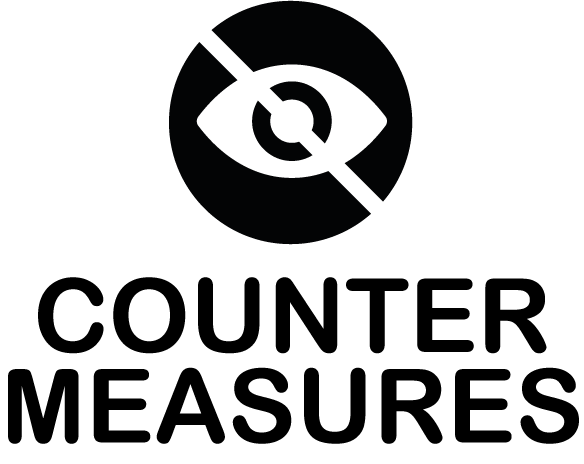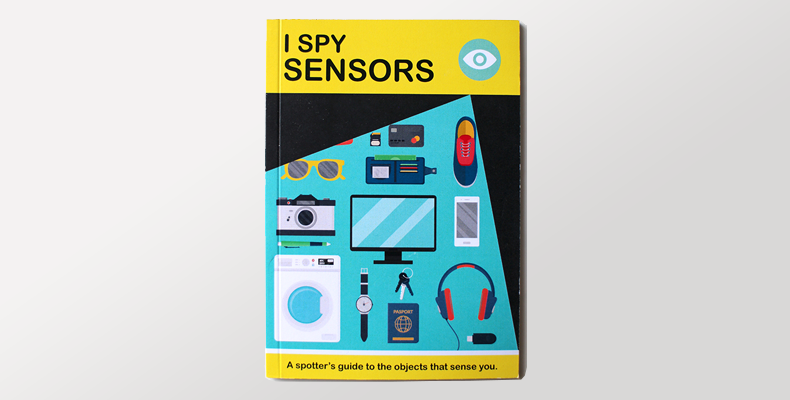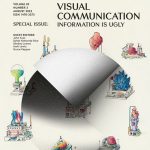Welcome to the home of the Countermeasures project – a research project based at the Royal College of Art, London and led by Angus Main. Our aim is to find creative ways to increase awareness of, and agency over, the sensors embedded in everyday objects.
Digital devices such as phones, tablets, TVs, headphones, and games consoles, contain dozens of sensors to measure everything from your movements to your blood pressure. Although we can’t see these sensors, they can observe many of our actions and behaviours in surprising detail.
To counteract the risks of surveillance which arise from these sensors, this project aims to help people identify ways of deceiving their devices by first understanding what sensors they contain, and then improvising methods of blocking or subverting their use.
To find out more about the background of the project please see the About page. To see some of the outcomes so far, click on the Book and Tool Kit links above.
Project News
- Evading Big Brother
 A write up of the methods and findings from our HDI Network funded project has been published in the Journal of Visual Communication, Volume 21, Issue 3. Our article “Evading Big Brother: Using visual methods to understand children’s perception of sensors and interest in subverting digital surveillance” can be found online here: https://journals.sagepub.com/doi/full/10.1177/14703572221093559
A write up of the methods and findings from our HDI Network funded project has been published in the Journal of Visual Communication, Volume 21, Issue 3. Our article “Evading Big Brother: Using visual methods to understand children’s perception of sensors and interest in subverting digital surveillance” can be found online here: https://journals.sagepub.com/doi/full/10.1177/14703572221093559 - Testing Countermeasures


 The second phase of our HDI Network research project with children involves testing the inventions created by kids in phase 1. As the inventions are speculative, this is less about practical testing and more about seeing what other children think of the concepts that were created. To do this testing during lock down restrictions we have created a website that helps us facilities a conversation with […]
The second phase of our HDI Network research project with children involves testing the inventions created by kids in phase 1. As the inventions are speculative, this is less about practical testing and more about seeing what other children think of the concepts that were created. To do this testing during lock down restrictions we have created a website that helps us facilities a conversation with […] - Co-Designing Sensor Disruptors With Children


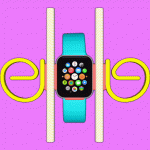 As part of our HDI Network funded research with children, we have been running a series of creative workshops to investigate children’s attitudes towards the sensors in common smart devices. The workshops have included a series of activities which allow children to explore their relationship with smart devices using creative and artistic methods. These include imagining the secret inner-space of their devices, and designing speculative tools […]
As part of our HDI Network funded research with children, we have been running a series of creative workshops to investigate children’s attitudes towards the sensors in common smart devices. The workshops have included a series of activities which allow children to explore their relationship with smart devices using creative and artistic methods. These include imagining the secret inner-space of their devices, and designing speculative tools […] - Countermeasures Network Event


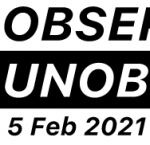 We will be holding our first Network Event for the HDI funded Countermeasures project “Giving children better control over how they’re observed by digital sensors” on Friday 5th February. This event will be a chance for members of our project network, including Royal College of Art, University College London, Glasgow School of Art, Dubit, Technology Will Save Us, Projects by If, Kids Know Best, BBC, and Glück Workshops, to meet and discuss the key themes of Kids, Technology, and Data Ethics.
We will be holding our first Network Event for the HDI funded Countermeasures project “Giving children better control over how they’re observed by digital sensors” on Friday 5th February. This event will be a chance for members of our project network, including Royal College of Art, University College London, Glasgow School of Art, Dubit, Technology Will Save Us, Projects by If, Kids Know Best, BBC, and Glück Workshops, to meet and discuss the key themes of Kids, Technology, and Data Ethics. - HDI Network Funding


 We’re pleased to announce that we have won funding for the project from the Human Data Interaction Network to continue research for the Countermeasures project. The HDI Network is a UK EPSRC Network Plus, focused on research which increases understanding and control over how our data is used by applications and systems. More information on the network can be found on their website here. The Countermeasures […]
We’re pleased to announce that we have won funding for the project from the Human Data Interaction Network to continue research for the Countermeasures project. The HDI Network is a UK EPSRC Network Plus, focused on research which increases understanding and control over how our data is used by applications and systems. More information on the network can be found on their website here. The Countermeasures […]
